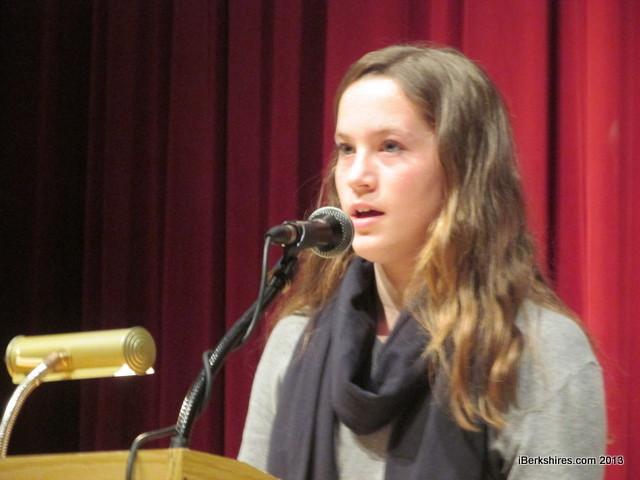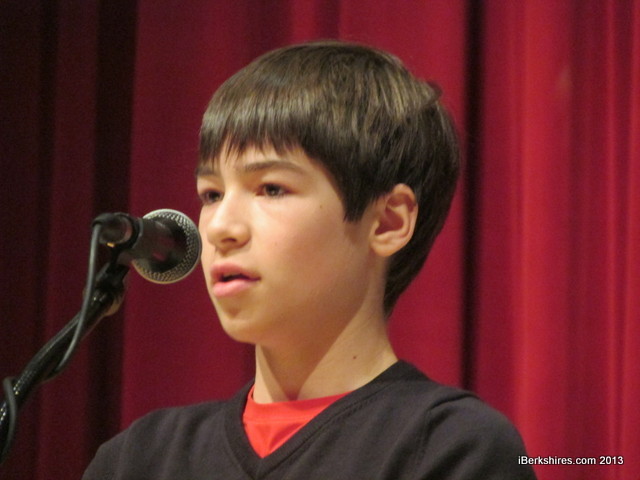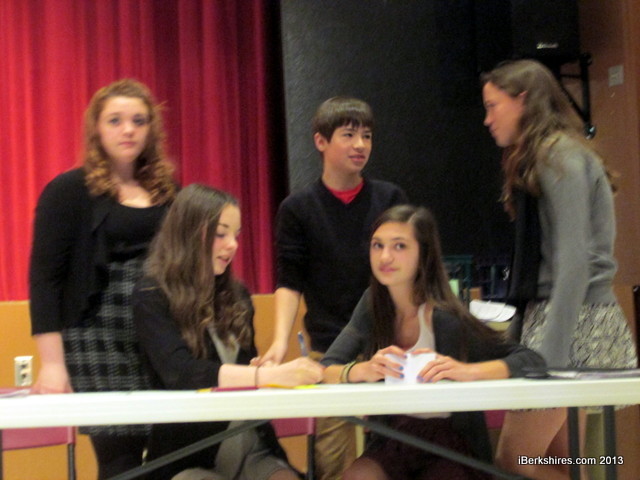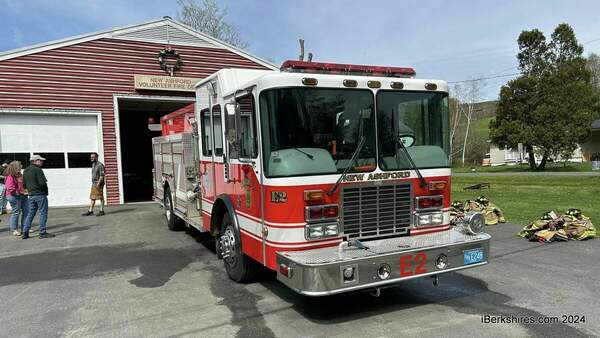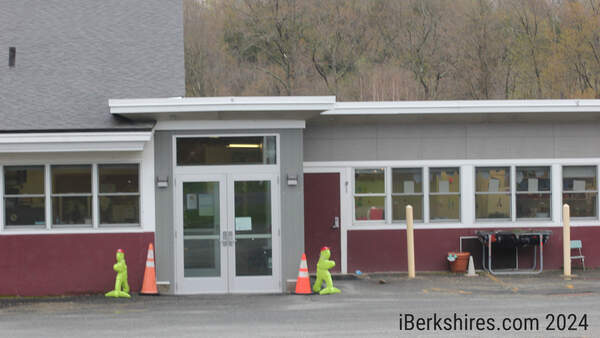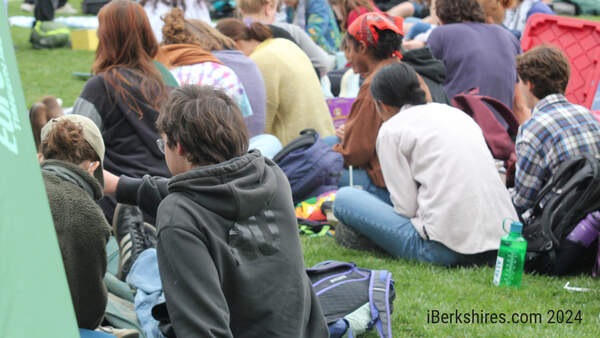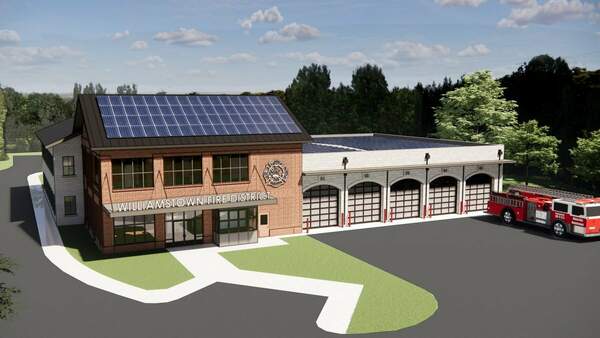Mount Greylock Students Learn From Annual Debates
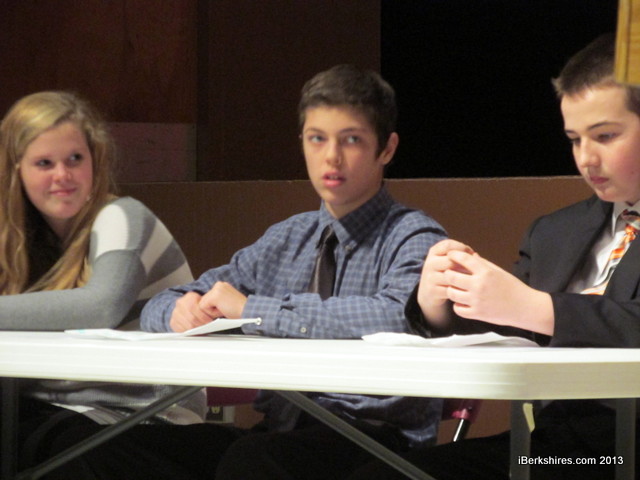 |
|
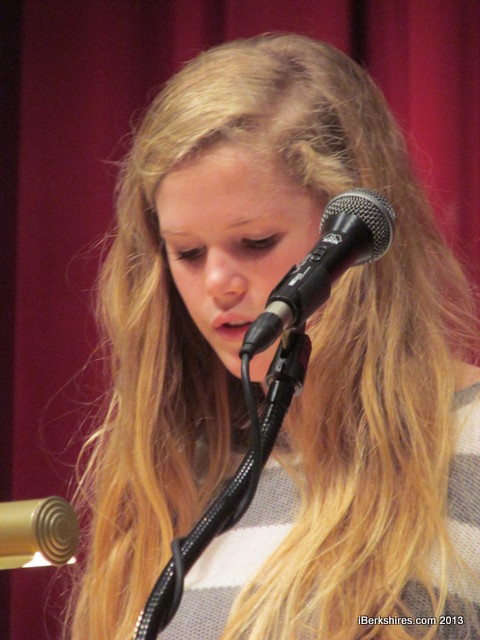 |
Eighth-graders at Mount Greylock Regional Middle School have been debating constitutional issues for more than a dozen years. This year's topics included free speech, equal rights and the death penalty. |
WILLIAMSTOWN, Mass. — It is not every day you hear Sen. Dianne Feinstein and Robert Bork quoted on the same side of a political issue.
But Mount Greylock Regional School eighth-grader Santana King managed to pair up the political odd couple on a recent Thursday morning in the school's auditorium.
King was one of the students participating in series of constitutional debates that have been conducted for about a dozen years at the school.
Students took on topics ranging from the death penalty to the Equal Rights Amendment.
King's topic was flag desecration. Specifically, she was arguing for the following resolution: "There should be an amendment to the Constitution to ban burning the American flag so that it cannot be protected by the First Amendment."
Teams of five students debated each side of the issue for about 30 minutes. It was the culmination of a several-week, interdisciplinary project coordinated by social studies teacher Pat Blackman and English teachers Sharyn Dupee and Janean Laidlaw.
"This is a challenging project," Blackman told the audience at the conclusion of the last debate in the series. "We mean it to be that. We all have been frustrated over the last few weeks. I have been, and the students have been. We mean it to be that way."
The challenge is worth it, Blackman said later.
"By far, it's a growth experience, especially since we added the paper," he said.
The process began in November when the students expressed an area of interest from among the seven topics up for debate. After they were assigned to the topic, each student researched his or her assigned issue and wrote a paper arguing for or against the resolution.
"In the past, there was not a position paper," Blackman said. "But persuasive writing is a main feature of the common core. Since we were doing this anyway, it seemed like a good fit."
After the papers were completed, the teachers divided the students in each topic into two teams, and a coin was flipped to see which team would argue affirmatively and which would argue the negative position.
On Thursday, Blackman polled the flag-desecration teams after the debate, and several said their personal opinions on the issue had been changed through the process.
No matter what those personal opinions may have been, each of the 10 students maintained a strong debating posture — respectfully challenging the assertions of the other team and attempting to persuade the audience, mostly their classmates with a few parents who were able to attend.
Most employed arguments they uncovered during their research. King, for example, found a quote from right-wing icon Bork, who once said, "Preventing [the flag's] desecration does not prevent you from expressing an idea," and coupled it with a quote from liberal legend Feinstein, who said in '06, "In a sense, I think, our flag is the physical fabric of our society."
The affirmative team seized on that sense of the flag as a special, even sacred civic object and argued repeatedly that burning a flag is a physical act, not speech.
The negative side, on the other hand, turned their opponents' patriotic argument around, maintaining, "Taking away freedom disrespects the veterans more," as Ethan Schoorlemmer put it.
Maia Hirsch strengthened that argument by bringing out the words of a Navy veteran quoted on the website of the American Civil Liberties Union.
"To have a law passed that effectively disables the First Amendment would be a slap in the face to me and to everyone else who has donated part or all of their life to preserving those freedoms," the site quotes John Magruder as saying.
Blackman said the debate series, which he helped start 13 years ago, is one of five interdisciplinary programs throughout the school year that allow students to look at social studies topics while honing their language skills.
Mount Greylock has no debate team or Model U.N. program, but Blackman said he would like to see something like that happen down the road.
"It's not an idea that's dead for me," he said. "The Gettysburg trip — I wanted to do that for five or six years before it happened. This will be our sixth year."
Blackman referenced the eighth grade's annual end-of-the-year trip to Gettysburg, Pa., at the end of the two-day series of debates last week.
"I'd rather have lawyers fighting it out in the courts than soldiers fighting it out on the battlefield," he said.
"The way we do debate today in this age of social media and such, we seem to ... move away from using reason and logic. We scream our opinions out in our status updates or on Twitter or wherever and expect that that's enough.
"It's not enough. It's allowed. We certainly have freedom of speech. You have a right to speak. That doesn't mean you have a right to be heard. You want to be heard. You want to persuade. You want to influence. Reason and logic is where it's at. That's what works. When that fails, things go bad."
Tags: constitution, MGRHS, school program,

